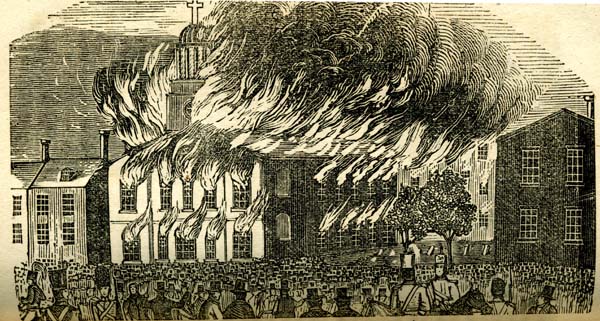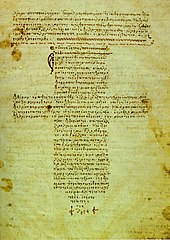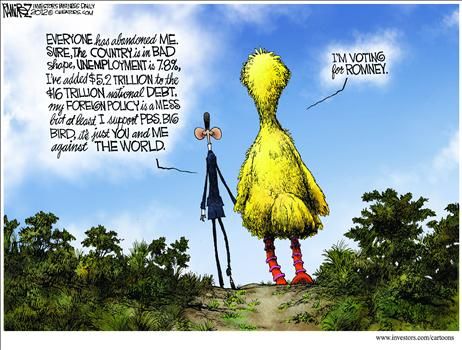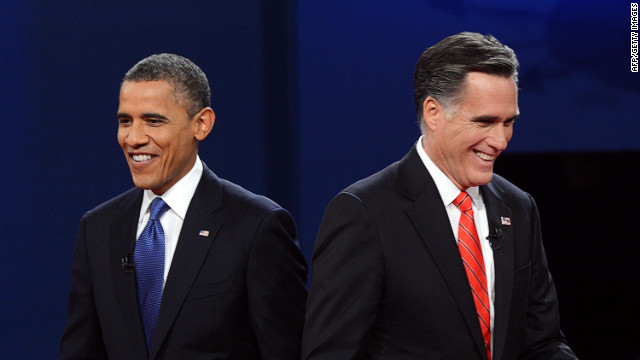There is a growing controversy that an American General may be losing his job because of his attempt to save the Americans, including our Ambassador, that eventually lost their lives in the Benghasi, Libya attack on September 11. You can read the report in the Washington Times story at this site:http://www.washingtontimes.com/blog/robbins-report/2012/oct/28/general-losing-his-job-over-benghazi/. This story has been reported on by AFA Radio 88.9 FM out of Steubenville but few if any major media outlets have reported, let alone followed up on this story.
U.S. Presidency: This course is offered to homeschool high school students every four years during a presidential election year and will satisfy the requirements for a basic civics course.
Wednesday, October 31, 2012
Tuesday, October 30, 2012
Conflicts with Religious Liberty and Conscience in the Health Care Professions: Four Views from the Battlefront
“It is not always easy to follow one’s conscience in obedience to God’s law. It may entail sacrifice and disadvantages, and one can in no way discount this cost; sometimes heroism is called for if one is to be faithful to these demands. Nevertheless, it must be clearly stated that the road of genuine progress for the human person passes through this constant fidelity to a conscience upholding rectitude and truth.” As well as being a mark of professional loyalty, conscientious objection on the part of the health care worker, for the right reasons, is highly meaningful as a social condemnation of a legal injustice against innocent and defenseless life.
Source: CHARTER FOR HEALTH CARE WORKERS published by the Pontifical Council for Pastoral Assistance to Health Care Workers
This last weekend, the Society of Catholic Social Scientists met for their 20th Annual Conference in Long Island, New York. Mr. McKeegan participated in a panel discussion that included four health professionals. They discussed the impact of the Health Care mandate on their respective professions (nursing, medicine, pharmacy and social worker) and initiatives being taken both by their respective professions and by individual states to put limits on conscientious objection by insisting on a referral clause. Copies of two of their presentations can be found here: The Pharmacist View of Religious Freedom and
The Physician View of Religious Liberty.
Friday, October 26, 2012
3rd PRESIDENTIAL DEBATE VIDEO

If you missed the last Presidential debate you can view it here. Final Presidential Debate October 22, 2012
Tuesday, October 23, 2012
The Al Smith Dinner with Governor Romney, President Obama and Cardinal Dolan in New York City

About the Alfred E. Smith Memorial Foundation Dinner
Although both his state and his country generously honored Alfred E. Smith after his death in 1944, the most unusual and notable memorial to him has been an ongoing series of black-tie dinners. Sponsored by the Alfred E. Smith Memorial Foundation, these annual fêtes were initiated by then-Archbishop (later Cardinal) Francis J. Spellman of the Archdiocese of New York in 1945. Since that time the Foundation has raised millions of dollars for healthcare causes.
Cardinal Spellman, capitalizing on the fact that Governor Smith died in the month of October (the peak of election season), used the dinner to remind later generations of Smith's extraordinary public career and unique role in political history by securing the participation of the leading political figures of those later generations. Over the years, the dinner has attracted the cream of modern American politics: the list of speakers and attendees reads like a who's who of the political landscape.

Today the dinner remains a true phenomenon - a living memorial to an uncommon public figure, best known as the first Roman Catholic presidential candidate, who died more than six decades ago. Doubtless the dinner's honoree would be deeply gratified that he is being remembered each year in this fashion. He would be even more gratified to know that the dinner commemorating him and his unique role in American politics has contributed millions of dollars for charitable endeavors in the city he loved so much.
On Thursday, October 18, 2012 the featured speakers were President Barack Obama and Governor Mitt Romney along with their host Cardinal Dolan. You can access their very short but entertaining speeches here: Romney, Obama and Cardinal Dolan's Speeches
Saturday, October 20, 2012
Videos of the Debates & the Mid-Term Exam

Did you miss one of the previous debates? You can view here the First Presidential Debate from the University of Denver, the Vice-Presidential Debate at Centre College and the Second Presidential Debate from Hofstra University.
The Mid-Term Exam is now posted on our Engrade site and the final question on the Mid-Term Exam requires you to answer questions from this Debate.
The Mid-Term Exam is now posted on our Engrade site and the final question on the Mid-Term Exam requires you to answer questions from this Debate.
FINAL PRESIDENTIAL DEBATE-October 22, 2012
| Topic: Foreign policy Air Time: 9:00-10:30 p.m. Eastern TimeLocation: Lynn University in Boca Raton, Florida Sponsor: Commission on Presidential Debates Participants: President Barack Obama and Governor Mitt Romney Moderator: Bob Schieffer (Host of Face the Nation on CBS) The format for the debate will be identical to the first presidential debate and will focus on foreign policy. |
Friday, October 19, 2012
The Battle of Yorktown


October 19, 1781 The Siege at Yorktown Ends
On this day in 1781, General Lord Cornwallis signed orders surrendering his British Army to a combined French and American force outside the Virginia tobacco port of Yorktown. This essentially ended the Revolutionary War but it wasn't until September 1783, that the final treaty was signed between the United States and Great Britain which officially ended the war and acknowledged American independence.
Sunday, October 14, 2012
Presidential Debate #2: October 16, 2012
Air Time: 9:00-10:30 p.m. Eastern Time
Location: Hofstra University in Hempstead, New York
Sponsor: Commission on Presidential Debates
Participants: President Barack Obama and Governor Mitt Romney
Moderator: Candy Crowley (CNN Chief Political Correspondent)
The second presidential debate will take the form of a town meeting, in which citizens will ask questions of the candidates on foreign and domestic issues. Candidates each will have two minutes to respond, and an additional minute for the moderator to facilitate a discussion. The town meeting participants will be undecided voters selected by the Gallup Organization.
Monday, October 8, 2012
History of Third Party Candidates

It was 1832, when for the first time in American history, a third party challenged the major two political parties.The Anti-Masonic Party carried 8% of the popular vote and one state. In 1848 former Democratic President Martin Van Buren was the presidential candidate of the anti-slavery Free-Soil Party. He wins 10% of the popular vote and is credited with taking enough votes away from the Democratic candidate to help Whig candidate Zachary Taylor win the election. And in 1856, another former president Milliard Fillmore runs as the presidential candidate of the Know-Nothings and Whig Party remnants (American Party) and wins 22% of the popular vote and 8 electoral votes.
In 1912, former Republican President Theodore Roosevelt formed the Progressive (or Bull-Moose) party. It was the first time in American history that a third-party candidate receives more votes (electoral and popular) than one of the major two parties when Roosevelt received 88 electoral votes and the incumbent Republican President William Taft received just 8 while the Democratic candidate Woodrow Wilson received 435 electoral votes.
In more modern times, three recent presidential elections were probably decided by third-party candidates. In 1968, Richard Nixon, a Republican, narrowly defeated Democrat Hubert Humphrey by less than 1% in the popular vote as many Southern Democrats supported Governor George Wallace of the American Independent Party who won 13+% of the popular vote and 46 electoral votes. In 1992, Democrat Bill Clinton won the presidential election with only 43% of the popular vote over the incumbent President George H.W. Bush because businessman Ross Perot of the Reform Party wins 19% of the popular vote and takes votes from President Bush.
And finally in 2000, George W. Bush, the Republican candidate won a disputed election over Democrat Al Gore who won the popular vote but lost the electoral vote by 4. Green Party candidate, Ralph Nader, took 2.74% of the popular vote that may otherwise have been cast for Gore.
Check future entries for the 2012 election third-party candidates.

It was 1832, when for the first time in American history, a third party challenged the major two political parties.The Anti-Masonic Party carried 8% of the popular vote and one state. In 1848 former Democratic President Martin Van Buren was the presidential candidate of the anti-slavery Free-Soil Party. He wins 10% of the popular vote and is credited with taking enough votes away from the Democratic candidate to help Whig candidate Zachary Taylor win the election. And in 1856, another former president Milliard Fillmore runs as the presidential candidate of the Know-Nothings and Whig Party remnants (American Party) and wins 22% of the popular vote and 8 electoral votes.
In 1912, former Republican President Theodore Roosevelt formed the Progressive (or Bull-Moose) party. It was the first time in American history that a third-party candidate receives more votes (electoral and popular) than one of the major two parties when Roosevelt received 88 electoral votes and the incumbent Republican President William Taft received just 8 while the Democratic candidate Woodrow Wilson received 435 electoral votes.
In more modern times, three recent presidential elections were probably decided by third-party candidates. In 1968, Richard Nixon, a Republican, narrowly defeated Democrat Hubert Humphrey by less than 1% in the popular vote as many Southern Democrats supported Governor George Wallace of the American Independent Party who won 13+% of the popular vote and 46 electoral votes. In 1992, Democrat Bill Clinton won the presidential election with only 43% of the popular vote over the incumbent President George H.W. Bush because businessman Ross Perot of the Reform Party wins 19% of the popular vote and takes votes from President Bush.
And finally in 2000, George W. Bush, the Republican candidate won a disputed election over Democrat Al Gore who won the popular vote but lost the electoral vote by 4. Green Party candidate, Ralph Nader, took 2.74% of the popular vote that may otherwise have been cast for Gore.
Check future entries for the 2012 election third-party candidates.
Friday, October 5, 2012
Nativist Riots in Philadelphia

St. Augustine's Church on fire
The "know nothings" or the Know Nothing Party was a nativist American political movement from 1852-1860. It was a secret society whose members professed ignorance about it and whose aim was to keep control of the government in the hands of native citizens. The movement was empowered by popular fears that the country was being overwhelmed by Irish Catholic immigrants, who were often regarded as hostile to US values and controlled by the Pope in Rome. The largely middle-class and entirely Protestant membership fragmented over the issue of slavery. Most ended up joining the Republican Party by the time of the 1860 Presidential election. Originating in New York in 1843 as the American Republican Party, the movement spread to other states as the Native American Party and became a national party in 1845. In 1855 it renamed itself the American Party. The origin of the "Know Nothing" term was in the semi-secret organization of the party. When a member was asked about its activities, he was supposed to reply, "I know nothing." The party was very anti-immigrant and especially anti-Catholic which led to the violent Nativist Riots in New York, Philadelphia and other cities and states where there was a sizable Irish-Catholic presence. To read about the Nativist Riots in Philadelphia and to answer your homework questions, go to the St. Philip Neri Parish History found under U.S. Presidents Useful Links.
Tuesday, October 2, 2012
First Presidential Debate: October 3, 2012
Wednesday night will be the first televised Presidential debate of three scheduled. See the schedule below of the other debate dates. Our Wednesday night class will start on time at 7PM and finish early at 8:50PM. It will be carried on Network TV, streamed live on the Internet and can be heard live on FM 89.9 the Public Radio station in Wheeling WV. Details of the debate are as follows:
Topic: Domestic policy
Air Time: 9:00-10:30 p.m. Eastern Time
Location: University of Denver in Denver, Colorado
Sponsor: Commission on Presidential Debates
Participants: President Barack Obama and Governor Mitt Romney
Moderator: Jim Lehrer (Host of NewsHour on PBS)
The debate will focus on domestic policy and be divided into six time segments of approximately 15 minutes each on topics to be selected by the moderator and announced several weeks before the debate.
The moderator will open each segment with a question, after which each candidate will have two minutes to respond. The moderator will use the balance of the time in the segment for a discussion of the topic.
Additional Homework Assignment: Identify four areas of domestic policy in which the two candidates clearly take opposite positions and be prepared to discuss in class. This is in addition to Homework Assignment Week 5.
Topic: Domestic policy
Air Time: 9:00-10:30 p.m. Eastern Time
Location: University of Denver in Denver, Colorado
Sponsor: Commission on Presidential Debates
Participants: President Barack Obama and Governor Mitt Romney
Moderator: Jim Lehrer (Host of NewsHour on PBS)
The debate will focus on domestic policy and be divided into six time segments of approximately 15 minutes each on topics to be selected by the moderator and announced several weeks before the debate.
The moderator will open each segment with a question, after which each candidate will have two minutes to respond. The moderator will use the balance of the time in the segment for a discussion of the topic.
Additional Homework Assignment: Identify four areas of domestic policy in which the two candidates clearly take opposite positions and be prepared to discuss in class. This is in addition to Homework Assignment Week 5.
Subscribe to:
Comments (Atom)



